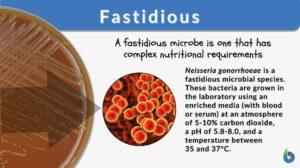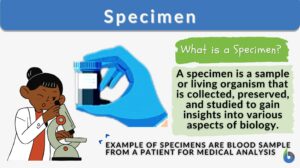Search Results for: microorganism
Microorganism
Definition noun, plural: microorganisms An organism that is microscopic or submicroscopic, which means it is too small to... Read More
Microbiology
Definition noun The branch of science that deals with microorganisms and their effects on other living... Read More
Phenol coefficient
Chemical disinfectants are categorized based on the power of their disinfection for microbes and viruses. Strong... Read More
Fastidious
Fastidious Definition We can define fastidious as a term used in microbiology to denote a species that lacks the ability to... Read More
Antibiotic
Definition noun, plural: antibiotics Antimicrobial agent made from microorganisms, and can kill and inhibit the growth of... Read More
Stock culture
stock culture A culture of a microorganism maintained solely for the purpose of keeping the microorganism in a viable... Read More
Diazotroph
Definition noun, plural: diazotrophs A microorganism capable of assimilating and fixing atmospheric nitrogen... Read More
Root nodules
Root nodule (Science: plant biology) globular structure formed on the roots of certain plants, notably legumes and alder, by... Read More
Exudate cell
Definition noun, plural: exudate cells Any of the cells participating in the forming of exudate during inflammation or a... Read More
Active agglutination
Definition noun An agglutination reaction in which the antigen is found naturally on particle Supplement Agglutination... Read More
Eukaryotic cells
Eukaryotic Cells Definition What is a eukaryotic cell? Eukaryotic cells refer to the cells of (or derived from) eukaryotes,... Read More
Susceptible
Resistance, vulnerability, sensitivity, tolerance, and susceptibility are some highly important terminologies across the... Read More
Phagocytosis
Phagocytosis Definition Phagocytosis is a basic physiological cellular process wherein a cell ingests a solid particle... Read More
Omnivorous diet
Definition noun A type of diet in which both animal and plant matter are the main food source Supplement An omnivorous diet... Read More
Brief Review on Climate Change and Tropical Peatlands
Peat soils are formed from biochemical process on moderately decomposed vegetation by aerobic microorganisms. It is mostly... Read More
Aerotolerant
Aerotolerant Definition The term "aerotolerant" pertains to an organism that does not require oxygen for growth but can... Read More
White blood cell
Definition noun, plural: white blood cells Any of the nucleated blood cells that lack hemoglobin, with a primary role in the... Read More
Unicellular
Unicellular organisms are organisms consisting of one cell only that performs all vital functions including metabolism,... Read More
Serous exudate
Definition noun A type of exudate that forms as a clear, thin, watery fluid with relatively low protein content, usually... Read More
Exogenous antigen
Definition noun Antigen that enters the body of the organism from the outside, e.g. through inhalation, ingestion, or... Read More
Biotic potential
When we look at the different forms of life, we often wonder how they have continued to exist one generation after another.... Read More
Psychrophile
Definition noun, plural: psychrophiles An organism that thrives in cold temperatures, i.e. ranging from −20 °C to +10... Read More
Axenic culture
Definition noun A microbial culture that contains only one species, variety, or strain of... Read More
Purulent exudate
Definition noun A type of exudate that is distinctively thick and yellowish, grayish or greenish in color, and consisting... Read More

















